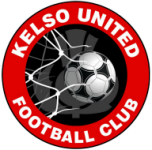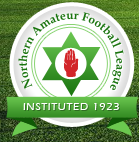| Founded | 1925 | |
|---|---|---|
| Dissolved | 1932 | |
| Ground | Wilton Lodge | |
| President | G. Hogg | |
| Match secretary | John Crossan [1] | |
Hawick United F.C. was a football club from Hawick, Roxburghshire which played in the East of Scotland League during the 1920s and 1930s.
| Founded | 1925 | |
|---|---|---|
| Dissolved | 1932 | |
| Ground | Wilton Lodge | |
| President | G. Hogg | |
| Match secretary | John Crossan [1] | |
Hawick United F.C. was a football club from Hawick, Roxburghshire which played in the East of Scotland League during the 1920s and 1930s.
The club was formed in 1925, making its bow with a 2–0 win over Stow Amateurs in October. [2] It entered the Border Cup for the first time in the 1925–26 season, and continued to do so until 1930–31; United only ever won ties in one season, in 1926–27, when victories over Coldstream and Leith Amateurs put the club in the final, at Ettrick Park in Selkirk. United went down 2–0 to the Civil Service Strollers, the Strollers taking the lead through a second-half penalty. [3]
Perhaps buoyed by this success, the club joined the Scottish Football Association in August 1927, entitling it to enter the Scottish Qualifying Cup. [4] However its debut in the competition in September was also its only match, a 6–1 defeat at the Strollers (after Johnstone gave Hawick the lead) [5] seemingly putting the team off renewing its Scottish FA membership.
The club played in the East of Scotland League from 1926–27 to 1930–31. However the club's record was poor, only once not finishing bottom (12th out of 16 in 1929–30). It also lost every tie it played in the King Cup over the same period.
The club's final season as a senior club was 1930–31, and United withdrew from the League after 8 games, having lost 7 of them, and being replaced by Jed Arts. [6] United joined the Border Amateur League for the rest of the season. [7]
United finished the 1930–31 season as runner-up in the Conan Doyle Cup, for amateur sides in the Borders area, losing to Chirnside in a final replay, [8] having let slip a 3-goal lead in the original game at Galashiels. [9] The last reference to the club playing is in a Borders Junior League match in March 1932, by which time it was playing the reserve sides of the clubs it used to meet on an even basis. [10]
The club wore black and white striped shirts with white shorts. [11]
The club played at Wilton Lodge. [12]

Kelso United Football Club were a senior football club based in Kelso, Scotland who played in the East of Scotland Football League. The club resigned from the league after three games of the 2015–16 season. Their final game was against Burntisland Shipyard on 29 August 2015 resulting in a 5–0 defeat.

Selkirk Football Club was a Scottish football club based in the town of Selkirk. Founded in 1880, they were the oldest established football club in the Scottish Borders. The club was selected as a founder member of the Lowland Football League, which was formed in 2013 by the Scottish Football Association (SFA) as part of a proposed pyramid system. Their home ground was Yarrow Park. Following financial problems, they resigned from the Lowland League during the 2018–19 season and later went out of business due to insurmountable debts and failure to keep their SFA membership.
Hawick Rugby Football Club is an semi-pro rugby union side, currently playing in the Scottish Premiership and Border League. The club was founded in 1885 and are based at Mansfield Park at Hawick in the Scottish Borders.

Gala Rugby Football Club is a rugby union team based in Galashiels in the Scottish Borders. Founded in 1875, it plays its home games at Netherdale. The team currently competes in Scottish National League Division One, the second tier of Scottish club rugby, and the Border League.
Kelso Rugby Football Club are a Scottish rugby union team founded in 1876. They play their home games at Poynder Park, Kelso in the Scottish Borders.

The Scottish Qualifying Cup was a football competition played in Scotland between 1895 and 2007. During that time, apart from a brief spell in the 1950s, it was the only way for non-league teams to qualify for the Scottish Cup. The Qualifying Cup was open to all full member clubs of the Scottish Football Association, who were not members of the Scottish Premier League or Scottish Football League. In June 2007 the Scottish Football Association announced a new format for the Scottish Cup from season 2007–08 that would allow all full member clubs direct entry into the competition and consequently the Qualifying Cup competition was scrapped.

The Northern Amateur Football League, also known as the Northern Amateur League and often simply as the Amateur League, is an association football league in Northern Ireland. It contains 13 divisions. These comprise four intermediate sections: the Premier Division, Division 1A, Division 1B and Division 1C; three junior sections: Division 2A, Division 2B and Division 2C; and six reserve sections.
The 2012–13 Scottish Cup was the 128th season of Scotland's most prestigious football knockout competition. The tournament began on 4 August 2012 and ended on 26 May 2013. It was sponsored by bookmaker William Hill in the second season of a three-year partnership and is known as the William Hill Scottish Cup. The winner of the competition qualified for the third qualifying round of the 2013–14 UEFA Europa League. The holders Hearts were knocked out by their Edinburgh rivals Hibernian in the fourth round, in a repeat of the previous season's final.
The 2013–14 Scottish Cup was the 129th season of Scotland's most prestigious football knockout competition. The tournament began on 14 September 2013 and ended on 17 May 2014. It was sponsored by bookmaker William Hill in the third season of a five-year partnership after a two-year extension was agreed, and was known as the William Hill Scottish Cup. The winner of the competition qualified for the second qualifying round of the 2014–15 UEFA Europa League.
The 2014–15 Scottish Cup was the 130th season of Scotland's most prestigious football knockout competition. The tournament was sponsored by bookmaker William Hill in what was the fourth season of a five-year partnership.
The 2011–12 East of Scotland Football League was the 83rd season of the East of Scotland Football League. The Spartans were the defending champions.
Langholm Sevens is an annual rugby sevens event held by Langholm RFC, in Langholm, Scotland. The Langholm Sevens was the last of the Border Sevens tournaments to be instated in 1908.
Hawick Sevens is an annual rugby sevens event held by Hawick RFC, in Hawick, Scotland. The Hawick Sevens tournament started in 1886 and is the third extant oldest Sevens tournament in the world; behind Melrose Sevens (1883) and Gala Sevens (1884).

Jed-Forest Sevens is an annual rugby sevens event held by Jed-Forest RFC, in Jedburgh, Scotland. The Jed-Forest Sevens was the fourth of the Border Sevens tournaments to be instated, in 1894, after the Melrose Sevens (1883), Gala Sevens (1884) and the Hawick Sevens (1885).
Earlston Sevens is an annual rugby sevens event held by Earlston RFC, in Earlston, Scotland. This was one of a group of Sevens tournaments instated after the First World War extending the original Borders Spring Circuit. The Earlston Sevens began in 1923.
Selkirk Sevens is an annual rugby sevens event held by Selkirk RFC, in Selkirk, Scotland. This was one of a group of Sevens tournaments instated after the First World War extending the original Borders Spring Circuit. The Selkirk Sevens began in 1919.
Kelso Sevens is an annual rugby sevens event held by Kelso RFC, in Kelso, Scotland. This was one of a group of Sevens tournaments instated after the First World War extending the original Borders Spring Circuit. The Kelso Sevens began in 1920.
The Scottish Unofficial Championship was the top league of Scotland's best amateur rugby union clubs. The Championship was 'unofficial' as the Scottish Rugby Union held that the sport should remain amateur and at the time did not sanction competitive games between the clubs.
Hawick Royal Albert Football Club is a Scottish football club based in the town of Hawick in the Scottish Borders. The club was founded in 1948 as Hawick Royal Albert and in 2019 merged with amateur side Hawick United to create Hawick Royal Albert United. The club plays its home matches at Albert Park and currently competes in the East of Scotland League Third Division. For the 2022/23 season, they dropped the name "United" from their title and incorporated a revised club badge.
The King Cup is an association football cup competition for members of the East of Scotland Football Association in Scotland. The competition was founded in 1886.